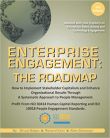Coming Soon to Companies Near You - People Report Cards?
What if every public company and those that do business with them had to publish each year a report on how they treat people, sharing specific methods and metrics addressing workforce turnover, skills and development training, compensation, benefits, workforce demographics including diversity, and health and safety, and the demographic composition of their boards?
By Bruce Bolger
 It is very likely that more detailed human capital disclosures could be required of public companies in under three years if SEC Chairman Gary Gensler has his way, and it appears he has the votes. The disclosures likely will affect companies that do business with public companies, which often expect their supply chains to follow the same regulations that apply to them. The SEC quietly announced last spring that it is “considering recommending that the Commission propose rule amendments to enhance registrant disclosures regarding human capital management.” More specifically, Chairman Gensler last year told a group at London City Week that the new rules could require “specific metrics, such as workforce turnover, skills and development training, compensation, benefits, workforce demographics including diversity, and health and safety.”
It is very likely that more detailed human capital disclosures could be required of public companies in under three years if SEC Chairman Gary Gensler has his way, and it appears he has the votes. The disclosures likely will affect companies that do business with public companies, which often expect their supply chains to follow the same regulations that apply to them. The SEC quietly announced last spring that it is “considering recommending that the Commission propose rule amendments to enhance registrant disclosures regarding human capital management.” More specifically, Chairman Gensler last year told a group at London City Week that the new rules could require “specific metrics, such as workforce turnover, skills and development training, compensation, benefits, workforce demographics including diversity, and health and safety.”
Why? Many observers now consider human capital material to organizational success. A study by London Business School Professor of Finance Alex Edmans, published in the Harvard Business Review, found that companies with high levels of employee engagement consistently outperformed their competitors in the market over a 28-year period. The Engaged Company Stock Index, a six-year experimental ETF (Exchange Traded Fund) based on about 40 companies with ratings indicating high levels of customer, employee, and community engagement, outperformed the S&P 500 by over 37 percentage points. The Goldman Sachs JUST Company Large Cap Equity Fund, based on similar metrics, also has outperformed the stock market indices since its inception three years ago.
According to a recent JUST Capital Survey of 1,115 Americans, “85% agree that companies need to disclose more about their business practices and impact on society; 90% of Americans say it is important that there is a common, standardized reporting structure for companies and an average of 87% support the federal government requiring corporate disclosure on human capital and environmental impact data, making performance comparable across companies and/or industries.”
The push for a commitment to reporting on the treatment of people is coming from a growing community of pension fund investors, including the Human Capital Management Coalition and Environmental, Social, Governance Investors. It also coming from customers, employees, and communities, according to surveys of the American public by JUST Capital, a think-tank focused on Stakeholder Capitalism. According to a survey earlier this year, almost 90% of Americans agree this is the time for large companies to focus on doing right by their stakeholders.
According to surveys by Gallup, only about 20% of employees say they are fully engaged at an estimated cost of over $8 trillion in lost productivity, quality, customer service, absenteeism, accidents, etc. Worker disengagement also has an impact on consumer frustration. According to the American Customer Satisfaction Index, Americans’ view of customer service has hovered in the low 70%-level for over 20 years.
Corporate America may not act until required. For example, it embraced Total Quality Management in the 1990s only when intense competitive pressure from Japanese manufacturers and the implementation of a strategic and systematic approach to quality management (propelled by ISO 9000 quality management standards) compelled them to do so.
What is needed is the same approach to people management that was applied to address our quality problems: A CEO-led strategic and systematic approach to managing people viewed as an investment, rather than as an expense to be minimized at all costs. This requires not only educating CEOs, CFOs, and boards on the economics of having highly engaged stakeholders, but on how to do it, because it requires a new holistic management approach that’s not taught in schools, which like most businesses silo the topics of human capital, sales and marketing, finance, and human resources.
At The Conference Board, more than 100 C-suite executives, as well as outside experts from private and public corporations, private-and public-sector investors, participated in a year-long working group culminating in a framework as well as guidance for Boards to address the brave new world that lies ahead. A few findings:
• Human capital management (HCM) is not a passing fad.
• Companies will need to clarify and codify the roles of the board and its committees with respect to HCM and ensure that they exercise their multiple powers in a coordinated manner.
• Management should ensure corporate culture is an integral part of the HCM strategy and programs.
• To provide both context and accountability, companies should use both quantitative and qualitative measures for evaluating HCM performance.
• Companies should ensure that boards have, or have access to, HCM expertise, whether directly through board members, board education, or outside experts.
The Conference Board is holding a series of working group meetings this spring on human capital management and reporting. (Editors note: Bolger is serving as an informal advisor to this program.) Click here to learn about Conference Board membership.
The successful transformation of quality in manufacturing proved the potential benefits of making the shift from a short-term, reactive, ad hoc approach to one that is CEO-led, strategic, and systematic with clear metrics. With quality management, it was the consumer and competition from the Japanese that forced the US to up its game. This time, ironically, the final push could come from investors and the SEC.
The winners will be workers, customers, communities, investors and, perhaps, capitalism itself.
Click here to get ESM news delivered each week.
Click here to get ESM news delivered each week.
Master the “S” of Environmental, Social, Governance (ESG), A.k.a. Stakeholder Capitalism
The Enterprise Engagement Alliance at TheEEA.org is the world’s first and only organization that focuses on outreach, certification and training, and advisory services to help organizations achieve their goals by fostering the proactive involvement of all stakeholders. This includes customers, employees, distribution and supply chain partners, and communities, or anyone connected to an organization’s success.
Training and Thought Leadership
- Founded in 2008, the Enterprise Engagement Alliance provides outreach, learning and certification in Enterprise Engagement, an implementation process for the “S” or Social of Stakeholder Capitalism and Human Capital Management and measurement of engagement across the organization.
- The Enterprise Engagement Alliance provides a training and certification program for business leaders, practitioners, and solution providers, as well as executive briefings and human capital gap analyses for senior leaders.
- The EEA produces an education program for CFOs for the CFO.University training program on Human Capital Management.
- Join the EEA to become a leader in the implementation of the “S” of ESG and Stakeholder Capitalism.
- The ESM information portal and The Enterprise Engagement Advisors Network solution provider marketplace cover all aspects of stakeholder engagement, and the EEA information library lists dozens of resources.
- The RRN information portal and Brand Media Coalition marketplace address the use of brands for gifting, incentives, recognition, and promotions. The BMC information library provides information and research resources.
Video Learning
The EEA Human Capital Management and ROI of Engagement YouTube channel features a growing library of 30- to 60-minute panel discussions with leading experts in all areas of engagement and total rewards.
- Enterprise Engagement for CEOs: The Little Blue Book for People-Centric Capitalists. A quick guide for CEOs.
- Enterprise Engagement: The Roadmap 5th Edition implementation guide. A comprehensive textbook for practitioners, academics, and students.
Enterprise Engagement Advisory Services
The Engagement Agency helps:
- Organizations of all types develop strategic Stakeholder Capitalism and Enterprise Engagement processes and human capital management and reporting strategies; conduct human capital gap analyses; design and implement strategic human capital management and reporting plans that address DEI (Diversity, Equity, and Inclusion), and assist with managed outsourcing of engagement products and services.
- Human resources, sales and marketing solution providers profit from the emerging discipline of human capital management and ROI of engagement through training and marketing services.
- Investors make sense of human capital reporting by public companies.
- Buyers and sellers of companies in the engagement space or business owners or buyers who seek to account for human capital in their mergers and acquistions.
For more information: Contact Bruce Bolger at Bolger@TheICEE.org or call 914-591-7600, ext. 230.















